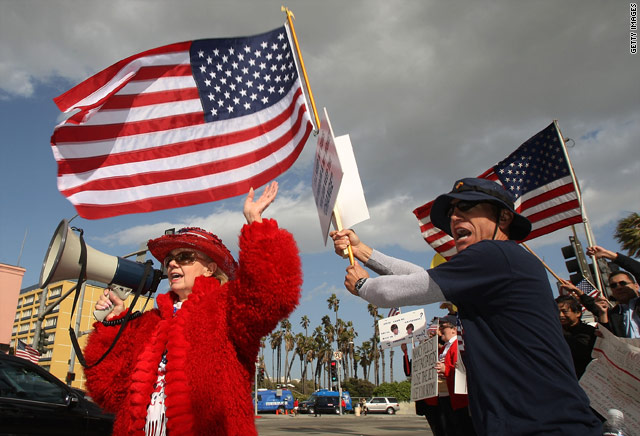The Tea Party movement and the prospects for Independent and Third Party candidates

Though it is almost universally accepted that the politics of the presidency make it virtually impervious to the efforts of independent and third party candidates, there is rarely ever any lack of speculation regarding their prospects. This fact is symptomatic of the public's deep discontent with the Democratic-Republican political establishment and the gridlocked two-party system.
Americans have not been shy in articulating this dissatisfaction to anyone who is willing to listen. In a New York Times/CBS News poll from April of this year, 46% of respondents agreed that "the country needs a third political party — a new party to compete with the Democratic and Republican parties." Since the Obama administration took office in January 2009, perhaps the two clearest expressions of public discontent with the Democratic-Republican party establishment are the development of the tea party movement and the marked rise in the number of self-described political independents.
As the tea party movement began gaining steam in the spring of '09, leading up to the first coordinated nationwide demonstrations on April 15th, the number of self-described independents surpassed that of Democrats and Republicans. As the Pew Research Center wrote in a report at the time: "On an annual basis, the only previous year when independent identification has been this high was in 1992 when Ross Perot ran a popular independent candidacy."
In a recent article for the print edition of Florida's Jacksonville Observer Monthly, author and political historian Darcy G. Richardson considered whether the tea party movement represents "a third party in the making," writing: "Democrats fear that the angry populism embodied in the growing movement could sweep them from power . . . while the Republicans worry . . . in the creation of a new and potentially viable third-party movement that could doom the GOP."
Their concerns are justified. Consider the case of Florida. The Florida TEA Party is an officially recognized political party in the Sunshine State. The party has already recruited two candidates for Congress and one for county commissioner. Peggy Dunmire's campaign in CD-8 is sure to be closely watched by national observers, as this seat is currently held by outspoken liberal Democrat Alan Grayson.
Contacted for comment via email, Mr. Richardson wrote that Dunmire may have a significant impact in the race, "possibly enough to be Alan Grayson's saving grace in what undoubtedly will be a close, hard-fought contest." He continued:
"The party's best showings, however, might take place in some of the state legislative races, where the Tea Party could end up with as many as twenty-five candidates," adding that they are "also trying to find a gubernatorial candidate, but time is running short."
Reading the tea leaves of the public's discontent with the Democratic and Republican parties, even seasoned politicians whose names are virtually synonymous with the political establishment have begun to reinvent themselves as independents. Florida governor Charlie Crist declared that he would run for Senate as an independent once it became clear that he could not defeat tea party favorite Marco Rubio in the Republican primary. The public has responded positively. Numerous opinion surveys show the newly declared independent leading his likely Republican and Democratic rivals.
This political trend is not confined to Florida, though it may be most pronounced on the east coast, and especially in the northeast where the Republican Party is weakest.
Real estate mogul Ray Boyd has announced that he will seek to become the first independent candidate for governor of Georgia since 1942, as reported by Ballot Access News. Democrat-turned-independent Tim Cahill's candidacy is ensuring a competitive three-person race for governor in Massachusetts. Independent Lincoln Chafee has consistently led polls in the race for governor of Rhode Island. In Maine, independent gubernatorial candidate Eliot Cutler is holding his own. As the Augusta Insider reported earlier this year: "Cutler is not only raising money, he’s seriously competing with the major-party candidates and their fundraising – no mean feat."
Strong showings or victories by any of these candidates – or by any of the many other independent and third party candidates for public office at all levels of government, of which there are literally hundreds all across the country – will undoubtedly fuel continued speculation as to the prospects for future third party and independent presidential hopefuls.
Of course, such speculation could easily be put to rest. All we have to do is vote for independent and third party alternatives to the Democrats and the Republicans.




